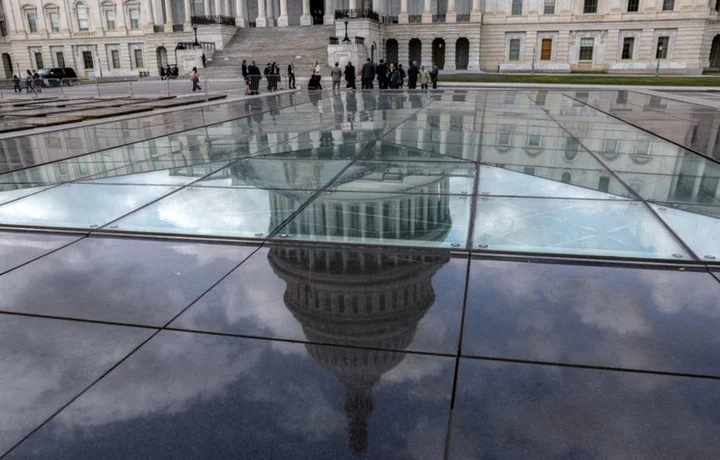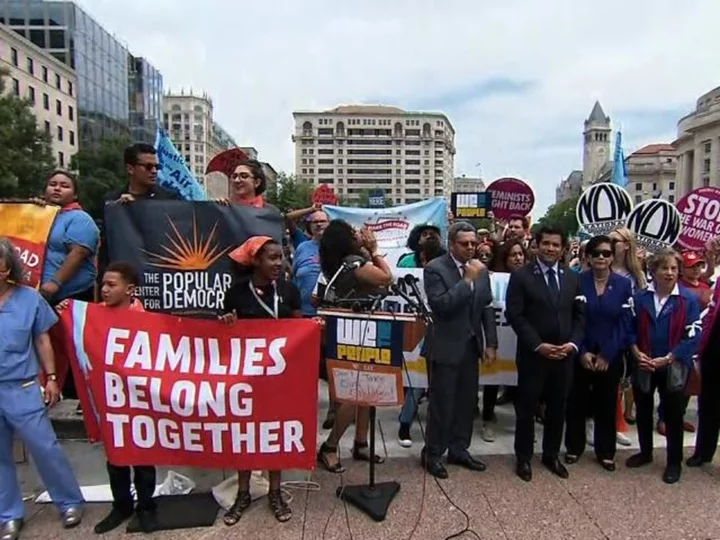By Andy Sullivan
WASHINGTON With the U.S. government due to run out of funding at midnight on Saturday, the Republican-controlled House of Representatives and the Democratic-controlled Senate are at odds over priorities they would like to include in legislation that would keep the government running in the new fiscal year that starts Oct. 1.
Here are some of the issues they are fighting over:
SPENDING
House of Representatives Speaker Kevin McCarthy, a Republican, and Democratic President Joe Biden agreed in May to set overall agency spending at $1.59 trillion for the new fiscal year, as part of a deal that suspended the government's $31.4 trillion borrowing limit and removed the risk of a debt default.
That agreement would keep spending roughly at the same level it is now, which amounts to an effective cut due to inflation.
But House Republicans are pushing for deeper cuts, saying Congress needs to do more to shrink the federal government and rein in annual budget deficits that have grown sharply since the COVID-19 pandemic. They are advancing a set of spending bills that would reduce agency spending by $120 billion, or 7.6% from the current level, though those cuts would fall most heavily on domestic social programs.
That is a relatively small slice of the total $6.4 trillion U.S. budget. Republicans are not proposing cuts to popular benefit programs like Social Security and Medicare, which are projected to grow dramatically as the U.S. population ages.
Biden says McCarthy should stick with the original deal, and the White House has said the president would veto at least two of those spending bills.
IMMIGRATION AND BORDER SECURITY
House Republicans say any spending bill that would avoid a shutdown should include new restrictions on immigration to deal with a surge of migrants at the country's southern border. Their proposal includes:
- Resumed construction of the U.S.-Mexico border wall, a signature policy of former Republican President Donald Trump
- Tight limits on asylum seekers that would require them to apply for U.S. protection outside the country, or remain in detention while their case is considered
- An increase in border agents and a boost in pay
Biden is seeking additional money for border enforcement, but his Democrats oppose the Republicans' proposals as draconian.
UKRAINE AID
Biden is seeking $24 billion for Ukraine to help fight Russia, on top of the $113 billion the U.S. has already provided.
A stopgap spending bill that has won bipartisan support in the Senate would include $6 billion for Ukraine. That leaves open the possibility for more aid later on.
But some House Republicans oppose additional aid to the country and say they will vote against any bill that includes it.
DISASTER AID
The Federal Emergency Management Agency (FEMA) has warned Congress that it could soon run out of money to help people recover from hurricanes, wildfires and other natural disasters. The Senate has included $6 billion in disaster aid in its bipartisan stopgap bill, but that could face opposition in the House if it is paired with Ukraine aid.
ABORTION, RACE AND OTHER SOCIAL ISSUES
House Republicans have sought to advance conservative social policies in several spending bills. Among them:
- prohibiting pharmacies from dispensing mifepristone, an abortion drug
- prohibiting the Defense Department from paying for employees to travel to states where it is legal to get an abortion
- prohibiting Defense Department racial diversity programs
- restrictions on teaching about racial topics
TRUMP CRIMINAL CASES
Former President Donald Trump has called on Republicans in Congress to slash funding for the Justice Department and the FBI. He is facing two federal criminal prosecutions for seeking to overturn his 2020 election loss and mishandling classified documents.
Some of Trump's allies in the House have backed that idea, but the chamber has not yet addressed Justice Department funding and it has not yet come up as a sticking point in the shutdown fight.
(Reporting by Andy Sullivan; Editing by Scott Malone)









